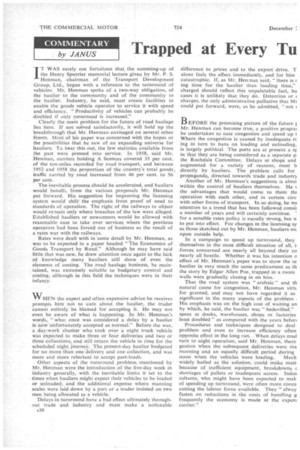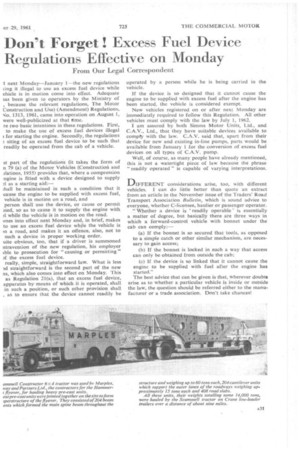Trapped at Every Tu
Page 32

Page 33

If you've noticed an error in this article please click here to report it so we can fix it.
Don't Forget ! Excess Fuel Device
Regulations Effective on Monday
From Our Legal Correspondent
COMMENTARY by JANUS
IT WAS surely not fortuitous that the summing-up of the Henry Spurrier memorial lecture given by Mr. P. S. Henman, chairman of the Transport Development Group, Ltd., began with a reference to the turnround of vehicles. Mr. Henman spoke of a two-way obligation, of the haulier to the community and of the community to the hatilier. Industry, he said, must create facilities to enable the goods vehicle operator to service it with speed and efficiency. " Productivity of vehicles can probably be doubled if only turnround is increased."
Clearly the main problem for the future of road haulage lies here. If not solved satisfactorily, it will hold up the breakthrough that Mr. Henman envisaged on several other fronts. Most of his paper was concerned with the hopes or the possibilities that he saw of an expanding universe for hauliers. To bear this out, the few statistics available from the past were pressed into service. In 1958, said Mr. Henman, carriers holding A licences covered 35 per cent. of the ton-miles recorded for road transport, and between 1952 and 1958 the proportion of the country's total goods , traffic carried by road increased from 46 per cent. to 56 per cent.
The inevitable process should be accelerated, and hauliers would benefit, from the various proposals Mr. Henman put forward. His suggestion for improving the licensing system would shift' the emphasis from proof of need to standards of operation. The right of the railways to object would remain only where breaches of the law were alleged. Established hauliers or newcomers would be allowed with reasonable ease to take over services where the previous operators had been forced out of business as the result of a rates war with the railways.
Rates were dealt with in some detail by Mr. Henman, as was to be expected in a paper headed "The Economics of Goods Transport by Road." Although he may have said little that was new, he drew attention once again to the lack of knowledge many hauliers still show of even the elements of costing. The road haulage business, he maintained, was extremely suitable to budgetary control and costing, although in this field the techniques were in their infancy.
WHEN the expert and often expensive advice he receives prompts him not to care about the haulier, the trader cannot entirely be blamed for accepting it. He may not even be aware of what is happening. In Mr. Henman's• words, "what once was considered a delay by a haulier is now unfortunately accepted as normal." Before the war, a day-work shunter who took over a night truck vehicle was expected to make three or four deliveries and two or three collections, and still return the vehicle in time for the scheduled night journey. The present-day haulier budgeted for no more than one delivery and one collection, arid was more and more reluctant to accept part-loads.
Other aspects of the turnround problem_ mentioned by Mr. Henman were the introduction of the five-day week in industry generally, with the inevitable limits it set to the times when hauliers might expect their vehicles to be loaded or unloaded; and the additional expense where manning scales were laid down by a port or a trader insisted on two men being allocated to a vehicle.
Delays in turnround have a bad effect ultimately throughout trade and industry and must make a noticeable A30 difference to prices and to the export drive. T alone feels the effect immediately, and for him catastrophic. If, as Mr. Henman said, " there is r ing time for the haulier than loading time," charged should reflect this unpalatable fact, bu cases it is unlikely that they do. Detention or c charges, the only administrative palliative that Mt could put forward, were, as he admitted, " not t
BEFORE the promising picture of the future Mr. Henman can become true, a positive prograt be undertaken to ease congestion and speed up t Where the congestion is caused by inadequate rc ing in turn to bans on loading and unloading, is largely political. The ports are at present a sr in that they are being considered as a separate ry the Rochdale Committee. Delays at shops and augmented for a variety of reasons, must b directly by hauliers. The problem calls for propaganda, directed towards trade and industry
Another of Mr. Henman's suggestions is almo within the control of hauliers themselves. He t the advantages that would come to them tht operation with each other, and in certain circ with other forms of transport. In so doing, he wa attention to a trend that has been followed consi a number of years and will certainly continue. for a sensible rates policy is equally strong, but n to put into effect. For changes in the licensing sy as those sketched out by Mr. Henman, hauliers mt. upon outside help.
In a campaign to speed up turnround, they themselves in the most difficult situation of all, ii forces concerned are nearly all beyond their co nearly all hostile. Whether it was his intention o effect of Mr. Henman's paper was to show the ur haulier in very much the same predicament as th the story by Edgar Allen Poe, trapped in a room walls were gradually closing in on him.
That the road system was " archaic " and th natural cause for congestion, Mr. Henman virtt for granted, and may not have regarded it as significant in the many aspects of the problem , His emphasis was on the high cost of waiting an by which, he said, the haulier was " bedevilled." spent at docks, warehouses, shops or factories least doubled" as compared with the years befort
Procedures and techniques designed to deal problem and even to increase efficiency often opposite effect in the long run. When delays mad turn to night operation, said Mr. Henman, there gestion when the subsequent deliveries were ma morning and an equally difficult period during noon when the vehicles were loading, Mech widely hailed as the solution, could make matt, because of inefficient equipment, breakdowns shortages of Pallets or inadequate access. Indus sultants, who might have been expected to mak of speeding up turnround, were often more conce cutting the labour force available. They " alway fasten on reductions in the costs of handling g frequently the economy is made at the expem carrier."
1 next Monday—January 1—the new regUlations cing it illegal to use an excess fuel device while chicle is in motion come into effect. Adequate las been given to operators by the Ministry of , because the relevant regulations, The Motor Construction and Use) (Amendment) Regulations, "To. 1313, 1961, came into operation on August 1, were well-publicized at that time.
re two basic intentions in these regulations. First, to make the use of excess fuel devices illegal for starting the engine. Secondly, the regulations : siting of an excess fuel device to be such that readily be operated from the cab of a vehicle.
st part of the regulations (it takes the form of
n 79 (a) of the Motor Vehicles (Construction and ilations, 1955) provides that, where a compression ,ngine is fitted with a device designed to supply A as a starting aid:—
hail be maintained in such a condition that it cause the engine to be supplied with excess fuel, vehicle is in motion on a road, and person shall use the device, or cause or permit ised, so as to cause it to supply the engine with A while the vehicle is in motion on the road.
Imes into effect next Monday and, in brief, makes to use an excess fuel device while the vehicle is in a road, and makes it an offence, also, not to such a device in proper working order.
uite obvious, too, that if a driver is summoned ntravention of the new regulation, his employer ible to prosecution for "causing or permitting" )f the excess fuel device.
really, simple, straightforward law. What is less id straightforward is the second part of the new as, which also comes into effect on Monday. This as Regulation 21(a), that an excess fuel device, apparatus by means of which it is operated, shall in such a position, or such other provision shall , as to ensure that the device cannot readily be operated by a person while he is being carried in the vehicle.
If the device is so designed that it cannot cause the engine to be supplied with excess fuel after the engine has been started, the vehicle is considered exempt.
New vehicles registered on or after next Monday are immediately required to follow this Regulation. All other vehicles must comply with the law by July 1, 1962.
I am assured by both Simms Motor Units, Ltd., and C.A.V., Ltd., that they have suitable devices available to compty with the law. C.A.V. said that, apart from their device for new and existing in-line pumps, parts would be available from January 1 for the conversion of excess fuel devices on all types of C.A.V. pump.
Well, of course, as many people have already mentioned, this is not a watertight piece of law because the phrase "readily operated" is capable of varying interpretations.
DIFFERENT considerations arise, too, with different vehicles. I can do little better than quote an extract from an article in the November issue of the Traders' Road Transport Association Bulletin, which is sound advice to everyone, whether C-licensee, haulier or passenger operator.
" Whether a device is 'readily operable ' is essentially a matter of degree, but basically there are three ways in which a forward-control vehicle with bonnet under the cab can comply:—
(a) If the bonnet is so secured that tools, as opposed to a simple catch or other similar mechanism, are necessary to gain access; (b) If the bonnet is locked in such a way that access can only be obtained from outside the cab; (c) If the device is so linked that it cannot cause the engine to be supplied with fuel after the engine has started."
The best advice that can be given is that, Wherever doubts arise as to whether a particular vehicle is inside or outside the law, the question should be referred either to the manufacturer or a trade association. Don't take chances!




























































































